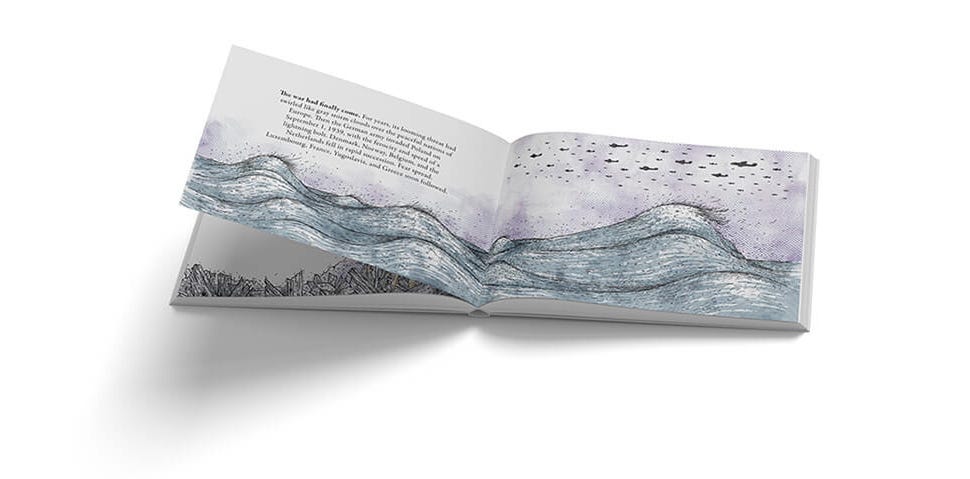The Songbird
Then voices began to rise across the rubble—sharing each new word, gaining in strength, and swelling with purpose.
I have always been fascinated by the resiliency of those who risked so much during World War II. It is my grandparent's generation and one I have learned from and continue to respect. This picture book (still in process) celebrates ordinary people who withstood the terror of bombs falling and their homes crumbling to rise again.
Darkness brought the first jarring explosion. Through the night, bombs shattered wood and windows, shaking stone into piles of rubble. At daybreak, an elderly woman bent and fearful, crawled through the destruction to the street beyond. Her eyes were bleary from the smoke and dust. Miraculously, she was unharmed.
The war had finally come. For years, its looming threat had swirled like gray storm clouds over the peaceful nations of Europe. Then the German army invaded Poland on September 1, 1939, with the ferocity and speed of a lightning bolt. Denmark, Norway, Belgium, and the Netherlands fell in rapid succession. Fear spread. Luxembourg, France, Yugoslavia, and Greece soon followed.

Only Great Britain stood stubborn and free, but the flame of freedom can be fragile. So people took action. Parents sent their children to the countryside to keep them safe. Adults constructed makeshift bomb shelters in the cities. Finally, on September 7, 1940, one year after Germany invaded Poland, German bombers appeared in British skies, raining destruction. The “Blitz” had arrived.
In London, the dreaded nights were long and sleepless. The citizens remained steadfast, but hope was fading. What new catastrophes would morning reveal?
It was on such a dark September morning when Elizabeth Evans, known to her neighbors as Betty, turned 75. It was also the day her home was destroyed. What had once been a quiet, welcoming lane was now reduced to rubble. Betty watched others sifting through bricks and glass and wood, searching for survivors, clearing the wicked mess, and blindly looking for hope.
Betty tried to help. She picked up a few small pieces of wood, then reached for larger pieces. Even using all of her strength, she could not make them budge. She had never felt so helpless.
The others continued lifting, loosening, and leveling loads of bricks and concrete. They had a purpose. But what could she do?
Betty had one thing to offer. It was her voice, her gift. She smiled when she remembered how her beloved father had always called her “my little songbird.” It wasn’t much, but she could share her voice.
At first, her song was quiet, barely audible over the sounds of her neighbors at work, trying to salvage something of their homes. But squaring her shoulders, she sang louder.
“Amazing grace, how sweet the sound that saved a wretch like me,” she sang. Her clear, shimmering voice rose higher, stronger, and sweeter, rising above the dust of the destruction.
A man nearby heard it first. His shoulders, stooped to his task, lifted to meet the song. He paused, stunned. He looked around and softly mumbled, “My, what a beautiful voice.”
Another man cocked his head and stopped his exhausting work. Next, a woman heard it, then six other people lifted their heads toward Betty. She stood amidst a heap of bricks, hands pressed against her sides.

Everyone froze. The work ceased. Men removed their hats. Slowly, they began to mouth the words, their shy voices joining in a hoarse chorus with each note Betty sang.
Then voices began to rise across the rubble—sharing each new word, gaining in strength, and swelling with purpose.
Encouragement filled the air like a soft breeze and spread through the gathering crowd
As Betty’s gentle voice released her final last soaring note, everyone paused, not wanting to disturb the newfound peace. One by one, they quietly breathed into the stillness.
Gradually, they returned to their desperate task, renewed with determination. Darker times would come, but hope had returned when it was needed most. Betty’s only gift, her lilting song brought a bit of beauty to a ravaged London street. A single voice brought a spark of courage that would spread throughout a city, to a nation, to the entire world. As long as people kept singing, hope lived and breathed and prevailed.
THE END.

